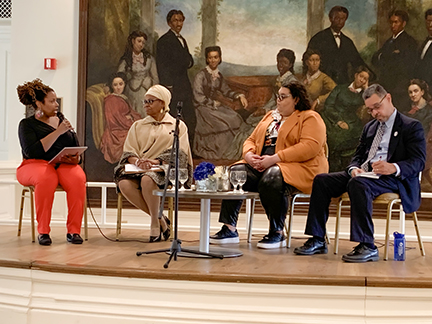By Natalie R. Bell
NASHVILLE, TN — The changing landscape of Nashville threatens to exclude, even erase some of the city’s African American history, said Dr. Doretha Williams, center director, Smith Center for the Curation and Digitization of African American History, Smithsonian National Museum of African American History and Culture (NMAAHC). Preservation of family heirlooms is crucial right now, she said, and local families need to take action to save their historical treasures.
Williams leads a team of curators from the Smithsonian NMAAHC in Washington, D.C., who’ve come to Nashville and been here several weeks now, providing preservation services and programs, free of charge, to the general public. The outreach program, called Community Curation Nashville, is here to share information on how to preserve such items as old photos and home movies. It is set up at Fisk University’s John Hope and Aurelia E. Franklin Library, located at 1000 17th Ave., North.
An NMAAHC signature event called “Hometown Treasures” will be held this coming weekend; Saturday, Oct. 28th, 10:00am – 5:00 pm, and Sunday Oct 29th, 12:00pm-5:00pm at Fisk University’s Frankin Library. The weekend expo of local history and cultural exhibits will highlight the need to save family treasures for generations to come. Professional reviews of old items like quilts, uniforms, dresses, ephemera and collectibles will be offered. Visitors may bring up to three items to be reviewed. Registration is not required, but recommended at the link below:
“Hometown Treasures,” at Fisk’s Franklin Library will feature exhibits brought in by local history organizations, such as the Jefferson Street Sound Museum, Metro Nashville Historical Commission, and the Middle Tennessee State University Center for Historic Preservation. Workshops on DIY preservation, as well as tours of Fisk University’s galleries and Aaron Douglas murals will be offered.
The NMAAHC’s outreach program, opened in Nashville almost a month ago, is now nearing the end of its six-week run.
Digitization services of family photos and home movies, VHS tapes, cassette tapes and the like, continued to be offered, at no cost, to the public. Individuals can bring their items to Fisk’s Franklin Library. Registration is not required, but recommended. Sign up for a one-hour session on their website:
https://nmaahc.si.edu/events/series/community-curation-2023-nashville
The NMAAHC Community Curation team has not come to purchase, or take items away from individuals, said Angela Winand, program administrator.
“Appraisal and money are not involved,” said Winand, adding that, they’re here to emphasize “preservation.” However, they can arrange discussions about donations, upon request.
Family treasures, such as quilts, antique dolls, old photos and Family Bibles that have been put away in an attic, or a storage bin, may be deteriorating. “We want to make sure family heirlooms come out of the attic, and are placed in proper storage.”
Community Curation Nashville has worked with local partners, including Tennessee State University and American Baptist College, to organize and plan programs, all of which are listed on the website. https://nmaahc.si.edu/events/series/community-curation-2023-nashville
An earlier signature event called, “A Seat at the Table,” held October 14thin the Appleton Room, of historic Jubilee Hall at Fisk, featured a panel of local preservationists and history professors. Panelists were seated in front of a floor-to- wall portrait of the Fisk Jubilee singers, which illuminated their discussion about how history can be interpreted from personal and family heirlooms.
Historians have largely interpreted the significance of the Fisk Jubilee Singers as, “The first international ambassadors for the culture,” based on two diaries that Ella Sheppard kept during their tour of Europe, remarked DeLisa Minor Harris, director, library operations at Fisk University. Sheppard was considered the matriarch of the original Jubilee Singers.
Panelist Elizabeth Johnson, director, library operations at Tennessee State University, said she challenges students to develop historical narratives with the photos they take, on their phones, of themselves interacting with others. “Develop your own historical narrative. It’s going to come from your own experience,” said Johnson.
Copyright 2023 TNTRIBUNE. All rights reserved.


